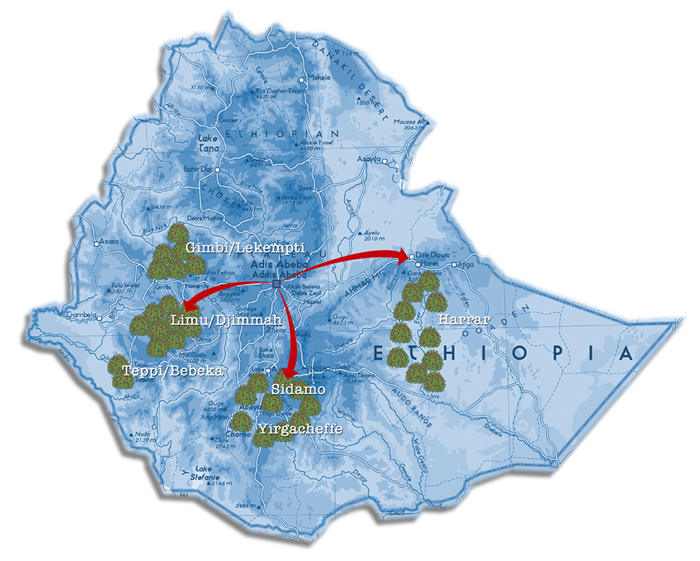A new product of raw bean-Harald of Ethiopia
New beans! New beans!
We who love coffee, every time the arrival of new beans is like welcoming distinguished guests from afar! And coffee beans really don't let us down! This time the Harald old friend becomes the new friend, the king returns, the majestic spirit is better than that year!
For Harald, coffee-loving friends are no stranger-excellent mellow, chocolate sweetness and cedar aroma naturally blend, full of tension taste impact, the afterrhyme is still long chocolate bitterness, right! Is the bitter sweet-the bitter sweet!
Of course, friends who know more about Harald are also aware of its ugly appearance and uneven image, including different sizes, unripe beans, dried dead beans, broken beans, and sometimes stones and wood chips, which are yellowish green as a whole. the same sun processing is not as elegant and neat as Yega, long beans and short beans are of different sizes. The point is that there are still some long beans that look like-- who has big teeth.
Well, the above mockery of Harald's appearance seems a bit lengthy, but it is precisely because its long, ugly appearance can be transformed into so beautiful, so unique and so wild after baking!

(several major card-producing areas in Ethiopia, the Harald area is located in the east, and its climate, soil and water are obviously different from those in the west.)
What's the reason? First of all, it is the authentic native species of Harald, which retains the essence of coffee thousands of years ago. The rich flavor of long beans, short beans and round beans is beyond the reach of New World coffee. In addition, unlike Cedamo, the dry and hot climate, less rainfall and unique local soil and water in Harald make its unique flavor different from that of coffee in the west of Ethiopia. In addition, in addition to increasing the sweetness and mellowness of the flavor, the unpopular earthy and wild flavor, if properly strengthened, combines with the good taste to form Harald's unique flavor. Of course, Harald is also graded. Traditionally, the highest Harald is exported as Grade4 to avoid taxes, while the lower Harald is much inferior in flavor, and the earthy and miscellaneous flavors are too prominent.
So where did the new bean Harald come from this time? The Queen City here is not a place name, but a brand of raw beans founded by Mr Abudirashid, whose Harald raw beans all come from some of the high-quality parts of the region. After the exquisite drying of the viaduct, there are multiple manual choices to pick out 20 per cent of the defective beans-reducing Harald's defect rate to the lowest level in history and changing Harald's poor public image.
(fine hand-picked scenes)
(Harald raw beans-obviously even and cleaner than before)
Of course, thanks to its exquisite processing and selection, the nearly flawless Harald is also unprecedentedly close to perfection in taste. The baking degree of city is just right to bring out its unique bitterness and sweetness, the rich chocolate aroma of dried incense with a hint of vanilla sweetness, the entrance of Sophora flavescens is like a blend of water and milk, the acidity is not very prominent, and the mellowness is also medium, but the sweetness in the aftertaste is extraordinary-Harald's unique chocolate bitterness. But perhaps because the processing is too exquisite and hand-selected too clean, the earthy smell and wild wind that once remembered Riharal can hardly be found in these beans-is this a great pity?
Important Notice :
前街咖啡 FrontStreet Coffee has moved to new addredd:
FrontStreet Coffee Address: 315,Donghua East Road,GuangZhou
Tel:020 38364473
- Prev

Brief introduction of coffee producing countries: Guatemala
Guatemala, whose name comes from the Mayan language, means the land of many trees, the country of the forest. Located in Central America, it is known as the pearl in the crown of China and the United States. Although Guatemala has a limited land area, it has a rich and diverse climate. A country famous for its lakes and volcanoes, with volcanic soil, precipitation, temperature, humidity and altitude, Guatemala has a natural environment suitable for coffee growth.
- Next

Ethiopian Coffee: holy City Harar
Harar is a famous producing area in eastern Ethiopia, the representative of ET sun-cured coffee, and it is also a classic of fine coffee world sun treatment or natural treatment. Harar, with a history of more than 1300 years, Harar is a veritable ancient city. Although archaeologists believe that the city was built in the 10th century, legends make people believe that the city's history should be longer. Harar in
Related
- How did the Salvadoran coffee industry develop in Central America?
- What exactly does the golden cup extraction of coffee mean?
- The Origin of Coffee flower
- [2023 Starbucks World Earth Day] there are more meaningful things besides free Starbucks coffee!
- What kind of coffee is there in Spain? 9 Flavors of Spanish Coffee
- Aromatic African coffee| Kenya's coffee culture and historical production area
- Liberica Coffee Bean knowledge: the characteristics of Liberian Coffee beans of the three original species of Coffee beans
- The origin and formula of Spanish latte introduces the taste characteristics of Bombon coffee in Valencia, Spain.
- How to adjust the solution of over-extracted coffee
- What is the tasting period of coffee beans? What is the period of coffee and beans? How should coffee wake up and raise beans?

